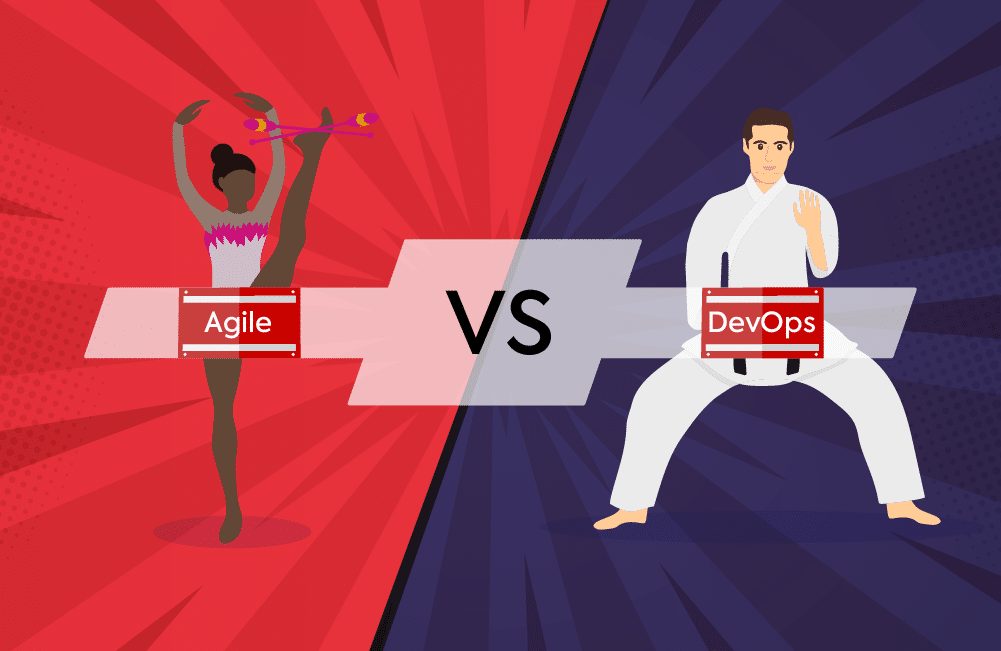DevOps vs. Agile: What Is the Difference?


DevOps and Agile are popular modern software development methodologies. According to the 14th Annual State of Agile Report, 95% and 76% of the respondents stated that their organizations had adopted Agile and DevOps development methods, respectively. Interestingly, both approaches have the same aim: deliver the end product as efficiently and quickly as possible.
Despite the popularity and shared goals of Agile and DevOps methodologies, there is often confusion about what differentiates them from each other. While most organizations are eager to deploy these development practices, they often struggle with the best approach to adopt.
In this blog post, we’ll explore both methodologies and outline their similarities and differences.
What Is Agile?
In software development, Agile is a methodology built around close collaboration, customer satisfaction, and small, rapid release cycles. It’s a step-by-step approach that aims to continuously produce small, manageable, and quality increments of software by means of iterative development and testing.
As the name implies, Agile advocates for flexibility and adaptability when building software—customer feedback or market changes are responded to quickly, instead of following rigid plans. That’s why Agile meets the demands of today’s fast-paced world in which customers desire continuous technological innovation.
The Agile philosophy is about people. It aims to build an organizational culture in which human interactions are favored over stringent processes. Agilists allow employees to be steered by their experience and shared values, instead of micromanaging or confining them to exhaustive documentation.
Agile was born in the early 2000s as an alternative to the traditional waterfall methodology. Waterfall focuses on a structured, sequential, and linear approach to developing software. It’s an inflexible model that doesn’t meet the expectations of the modern world.
Agile is a collection of values and principles that assists in directing software development decisions. It’s not one single approach. It’s a collection of a broad range of practices, such as Scrum, Kanban, Extreme Programming (XP), which developers used before its popularization. The aggregation of these practices resulted in the publication of the Agile Manifesto, which outlines the core values and principles of the Agile software development methodology.
What Is DevOps?
DevOps is a methodology that combines software development (Dev) and operations (Ops). It’s a culture, a state of mind that allows the software to be created, tested, and released reliably, quickly, and efficiently by embracing Agile values and principles.
In both DevOps and Agile environments, the software is developed, tested, and deployed. Traditional Agile, however, does not consider IT operations, which happens continually and is an essential aspect of the DevOps pipeline. In fact, DevOps aims to incorporate Agile practices to a new audience: the operations team.
DevOps seeks to break the barriers between the development team that writes the code and the operations team that deploys and manages the software in production. It eliminates the old technique of development teams writing an application and then leaving the operations teams to run it without sufficient visibility into how it was created. It’s a new approach that empowers these two teams to work side by side throughout the software development life cycle.
By bringing together these two diverse groups, DevOps supports continuous integration (CI) and continuous deployment (CD), automated testing, and transparent processes in software development.
DevOps came to the fore around 2009. Since then, the approach has metamorphosed to include other revolutionary software development techniques. For example, DevSecOps is a growing practice that involves integrating security into DevOps right from the beginning.
DevOps vs. Agile Comparison
DevOps and Agile both aim to enhance the software development process. They emphasize quality results, efficiency, and speed when developing software. They also advocate for shorter, frequent release cycles.
One term that permeates both methodologies is the idea of shifting left. It refers to improving software quality by finding and fixing defects during the early stages of the software development process.
So what is the difference between DevOps and Agile?
Although both methodologies aim for the same end goal, they do so by taking different routes.
Let’s look at some concepts that set them apart.
1. Teams
A major differentiating factor in the Agile versus DevOps comparison debate is how each team is structured. Basically, DevOps unites two large disparate teams to work together to deliver faster, more reliable software releases. The skillset is divided among the members of the development and operations teams. This implies that everyone is assigned specific duties to accomplish during the development process.
This DevOps approach encourages inter-department collaboration and reduces friction between the development and operations teams. Since every team member is a master of their respective skills, however, it could limit their ability to step into each other’s shoes.
The Agile approach, on the other hand, seeks to bring smaller teams together so that they can collaborate and swiftly address the ever-changing consumer expectations. Instead of allocating specific tasks to members, it encourages each of them to share duties equally. This makes any Agile team member capable of handling any aspect of the project at any time. Since the groups are isolated, however, it could limit cross-functionality within the organization.
2. Strategies
DevOps and Agile also differ in terms of their strategies and processes. In DevOps, automation methodologies are employed to boost productivity and maximize efficiency. In Agile processes, however, automation is not emphasized, though it can still be used to improve output.
Another differentiating strategy is the use of sprints in Agile projects. The idea with sprints is that tasks are broken down into short, repeatable phases, usually lasting one to four weeks. The assigned duties are completed in increments, with every sprint beginning immediately after the previous one. DevOps provides continuous delivery with specific deadlines to hit and benchmarks to realize, some of which can be daily or within a few hours.
DevOps and Agile also tend to use different tools when implementing their strategies. Some of the popular DevOps tools include Jenkins, CircleCI, and Azure DevOps Pipelines. Agile, on the other hand, uses such popular tools as MindMeister, Aha!, and Trello.
Agile vs. DevOps: Which Is Better?
The most important thing to understand about the DevOps versus Agile debate is that they are not mutually exclusive. It may not be necessary to choose one over the other. Although they are different, a blend of both disciplines can lead to more beneficial outcomes.
Agile replaced the traditional waterfall model. DevOps, however, is not an Agile replacement. DevOps rose to prominence because of Agile. Therefore, the two can coexist and enable each other.
Instead of trying to choose between Agile and DevOps, you can apply them in tandem. That’s the best way of surmounting their individual weaknesses and making the most out of them.
For example, you can empower individual teams to embrace an Agile approach within a wider DevOps culture. That way, each of their biases can be used together in a complementary manner.
What About Agile and DevOps Security?
Effectively implementing DevOps and Agile practices requires security consciousness; otherwise, your efforts could be grounded on sinking sand. Incorporating security into your Agile and DevOps cycle can deliver robust applications that enhance the user satisfaction rate.
